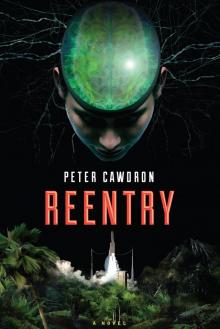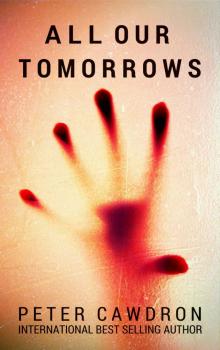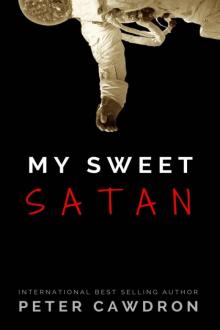- Home
- Peter Cawdron
We Are Legion (van Helsing Diaries Book 2) Page 2
We Are Legion (van Helsing Diaries Book 2) Read online
Page 2
“Is this some kind of joke?” she asks.
My throat is constricted. Wheezing, I try to speak, but all that comes out is a deep moan.
“I need to warn you that your call is being recorded. Prank calls to 9-1-1 are classified as a misdemeanor and are punishable with a fine of up to five thousand dollars. Do you understand?”
I try to reply, but I can’t.
The call cuts out.
I can’t wait. Grabbing hold of the kitchen chair, I drag myself to me feet and make my way to the door, stumbling out into the snow and collapsing in my car.
The drive to the hospital is erratic. I drive through stop signs, swerve onto the wrong side of the road, clip the snow-covered curb several times, and flatten a yield sign before colliding with a parked car in the hospital parking lot. Doubled over, I make my way to the emergency entrance. One of the paramedics sees me and hoists my arm over his shoulder, helping me through the doors.
“Alan?” the duty doctor says as I’m bundled onto a stretcher and wheeled into the triage station.
“Hey, Joe,” I manage, trying to smile against yet another crippling cramp forcing me into a fetal position.
“Talk to me, Alan,” he cries, flicking a flashlight in each eye and checking my pupil response. “What have you been exposed to? Food? Drink? Drugs?”
I shake my head, unable to answer. Foam dribbles from my mouth. I must look like I’m overdosing.
A nurse standing next to him says, “He’s running a fever of 105. Pulse is erratic. Blood pressure is one thirty over forty. He’s about to go into cardiac arrest.”
I vomit, bringing up bile.
Joe says, “Get him on an IV and antiemetics. I want bloods run. We need to know what we’re dealing with.”
He turns to me, resting his gloved hand on my forehead and saying, “Hang in there, buddy.”
I’m shaking violently. A nurse runs Velcro straps around my arms and legs, and I flex, trying to tear them from the steel railing on the stretcher as another seizure rips through my body.
“Hold him down,” Joe says, administering what I’m guessing is a sedative.
Darkness is a relief, sparing me from more pain, and reality blurs as the lights and noises around me fade.
When the light returns, I’m lying in a private hospital room adjacent to intensive care. Every muscle aches. Although it feels as though only moments have passed since I was in the ER, I’m aware considerable time has transpired as I can feel a thick mat of facial hair on my cheeks and around my mouth. My neck is itchy.
I recognize this room. I’ve cared for patients in here. A nurse peers through a glass window and sees I’m awake. She places a quick call and then comes in to talk with me.
“How are you feeling?” she asks.
I try to speak, but my throat is dry.
She pours a glass of water and holds it to my lips. I sip at the water. Although I want to drink the whole glass, moderation is needed.
“Thank you,” I manage. “Feeling… better.”
“Good,” she says, making notes on an electronic pad.
My friend and professional associate Joe Marring comes rushing in, slightly out of breath.
“Hey,” I manage, trying to raise my arm, but it feels as though weights drag my feeble fingers back to the mattress. I am a mannequin, clipped of his puppet strings.
A drip runs into a vein on the back of my hand.
Joe smiles.
“Welcome back,” he says.
“How long?” I ask, struggling against a dry throat.
“Six or seven days,” he replies. “I’d have to check.”
I try to sit up, but my head spins.
“Hey, take it easy,” he says.
“What?”
“What happened?” Joe asks, looking to interpret my one word question. “Buddy, you flatlined twice. And your blood. I’ve never seen anything like your lab report. White cell count was almost nonexistent. Red cells rupturing all over the place. McCarthy thought you might have some form of hemorrhagic virus. We pumped twelve pints of blood into you on the first day alone. The CDC heard about the possibility of a tropical outbreak in snowbound Boise and wanted blood samples. They put Boise on alert for any subsequent infections at surrounding hospitals, but it looks like it was just you, Bud. We pumped you full of antibiotics and antivirals, and waited.”
“Jane?” I ask. Although it might seem as though I’m asking to see her, I’m not. I think she was the source. I need to know where she is.
“No one’s seen her.”
A tear comes to my eye.
“The scratches on your chest?” Joe asks. “Were they caused by an animal?”
I shake my head. Looking down at the loose fitting hospital gown, I catch a glimpse of my chest. Faint red scratches still line my skin, but they’re healing. Scabs have formed.
“Have you come in contact with any wild bats?”
“Bats?” I reply, surprised by the notion.
“Your bloods came back with traces of histoplasmosis and half a dozen other nasty bacterial infections, along with East Venezuelan mammalian virus and rabies strand-C. The only known carriers in the North America are bats, but how the hell you came across a bat in the middle of an Idaho winter is lost on me.”
“Not a bat,” I manage as my head sinks into the pillow.
“Well, rest up, buddy. You’re lucky to be alive.”
Chapter 2:02 — Finding Jane
It’s another two days before I’m discharged from the hospital. My mom and dad have visited every day, and I’ve had their anxiety to deal with on top of my own. They have lots of questions about Jane, but I have no answers.
“You sure made a mess of that car,” Dad says, making light of my mad dash to the hospital as we sit outside a patient interview room adjacent to ER. “Good thing you’ve got that fancy doctor’s insurance. The mechanic will have it back to you tomorrow.”
I nod.
Mom tries not to look nervous. She’s silent, fidgeting with her hands. She’s worried about me, worried about Jane.
Sheriff Cann walks over while we’re waiting for the final paperwork to be signed.
“Alan,” he says, pulling his Stetson from his head with seasoned practice. He slips the hat under his arm and reaches out and shakes my hand. We met at Jane’s Christmas work party.
“Sheriff.”
“How are you feeling?” he asks, sitting beside me and gesturing a quick hello to my folks with a wave of his hand.
“Fine, I guess. Still playing catch up.”
“Doc Marring says you had it pretty rough.”
“Yeah.”
“What do you remember?” the sheriff asks, and I know what he means. He’s not talking about the past few days in the hospital. He’s asking about Jane.
“She was strange,” I say. “Different. I—I know it sounds crazy, but her behavior was out of character. She was… She wasn’t herself.”
The sheriff nods, pursing his lips before asking, “Have you heard from her?”
“No.”
He goes to get up, when I grab his arm, asking him, “What happened to my wife, Sheriff?”
“I don’t know,” he says. “I was hoping you might be able to tell me.”
When he says he doesn’t know, there’s an implicit understanding between us. I can see it in his eyes. He cares for her beyond his professional capacity. They were friends.
My heart sinks.
“We found her car at the airport. She bought a ticket to Chicago, but that’s as far as I can trace her. There’s no sign of foul play, so the FBI isn’t interested in taking the investigation further.”
“Chicago?” I say, lost in thought.
“Did she know anyone in Chicago?” the sheriff asks.
“No. Jane’s from a small town in northern Minnesota, about an hour from Duluth. She studied in Portland and hated it. Portland was too big for her. We met in Salt Lake City at a conference. Getting away from the city and seeing the
salt flats was all she could talk about. She’s always been a mountain girl—loved the outdoors. I can’t imagine her in the smog of a big city like Chicago.”
And a knot forms in my throat. She loved the outdoors? Why the past tense? Why not, she loves the outdoors? My slip of the tongue goes unnoticed by the sheriff, but I feel her loss. Deep down, I fear she’s dead.
“Did she mention Martin Ellison to you?” the sheriff asks with my parents listening intently to every word.
I think for a moment, racking my brains before shaking my head softly and saying, “No.”
“He’s a prisoner over at the federal penitentiary. Jane took a book from him. Does that mean anything to you?”
“A book? What kind of book?”
“I don’t know, but Ellison is freaking out about it, demanding it back.”
“She didn’t mention it to me,” I say.
“Doesn’t matter,” the sheriff says. “Probably nothing. Warden says Ellison’s crazy. Says he’s been unhinged ever since her visit.”
I’m silent.
“If you think of anything,” he says, handing me his card. “Just call. Any time. Night or day.”
“What did she do?” my mom asks. I know her well enough to detect a slight hint of panic in her voice.
“You don’t know?”
“No.”
“She’s a hero. She killed a murderer, shot her in self-defense. Jasmine Halter slit the throats of her husband and kids. I don’t know how Jane knew, but she did. She confronted Halter. Halter rushed at her with a knife and Jane shot her dead.”
Like my folks, I’m stunned. None of this makes any sense. I shake my head with disbelief. This doesn’t sound like my wife. And after what happened between us that night, I can’t fathom how her personality could change so radically in such a short period of time.
“Why would she run?” my dad asks, beating me to the question.
“Maybe she thought she was in trouble? But given the evidence in that home, she’s got nothing to fear. No jury would convict. Hell, I doubt the state prosecutor will bring charges. He’s liable to recommend her for a medal instead.”
My mind’s blank.
“Listen,” the sheriff says, facing me. “If she reaches out to you, tell her everything’s going to be fine. Justifiable homicide. She’s got nothing to worry about. Tell her to come home.”
“I will,” I say as he gets up. The sheriff nods, puts his hat on and walks away.
Joe’s been listening. I’m not sure how long he’s been standing in the doorway, but he hands me a few insurance forms, saying, “I hope you find her.”
“Hey, thanks,” I say, getting to my feet and taking the forms from him. Although my recollection of Jane is skewed by our last night together, I don’t think she’s running from anything. I think she’s running toward something, and wherever she is, she’s had a week to disappear.
“Let’s get you home,” Mom says, picking up her handbag.
“I’m heading out that way,” Joe says, glancing at me with a knowing look. “I can drop you off, if you like.”
“That would be great,” I say before either Mom or Dad can respond. I don’t mean to be rude, but having them fuss over me is a little overwhelming, and Mom is going to freak out when she sees the apartment.
“You don’t want us to come by and help out?” Dad says, being as intuitively aware of polite social constructs as ever. Like Mom, I guess he's confused by what's happened. Mom looks a little upset at the prospect of being sidelined, but Dad understands, and his words are more for her than me. He’s already figured out my preference and is trying to let Mom down easily. He rests a friendly hand on my shoulder.
“I’m fine, really,” I say, giving him a hug.
“You call us every day,” Mom says as I kiss her on the cheek.
“I will. I promise.”
Joe and I walk off.
“You looked a little cramped there,” Joe says once we’re out of earshot, knowing he’s rescued me from a million well-intended but prying questions.
I laugh softly.
“Yeah, they want to help, but at the moment I need some time to get my head together.”
Outside, it’s a beautiful winter day. Not a cloud in the sky. The streets are clear of snow and ice. Although the air is crisp, I feel warm in my thick jacket. Spring is coming.
“Are you going to go after her?” Joe asks as we pull out of the parking lot in his Audi Quattro. I’m an American muscle car lover, but Joe likes the European styling, and I must admit, the Audi is plush.
“Yep,” I say, nodding, although I’m not trying to win her back. Jane almost killed me. I want to know why. She ran out on me. I want answers.
Joe turns on the car radio to break the awkward silence between us.
“Listen,” he says as an old Eagles song begins to play. “I know it’s a cliché and all, but if you need to talk, you know I’m always here for you, right?”
“Thanks,” I reply, taking my eyes from the snow covered fields for a moment and acknowledging him.
“It’s good to see you bouncing back,” he says, trying not to take his eyes off the road. “You had me worried.”
After a few miles, we pull into my apartment complex. There’s a light on inside the apartment.
Joe brings the car to a slow stop, putting the transmission in park and asking, “Do you want me to come in?”
“No,” I say, knowing the apartment looks like a drug den. I hate to think what the cost will be to replace our furniture and repair the walls and doors, but that’s the least of my problems at the moment.
“Okay,” he says, nodding his head slowly. “Listen, I’m going to wait here until you’re inside. Just stick your head through the curtains and give me a wave or something, will you? Let me know you’re all right.”
“Jesus, Joe,” I say, not sure whether to laugh or feel horrified. “You’re freaking me out.”
“You know what I mean,” he says. “Everyone heard about the wolf and stuff. And with Jane and all. I just want to be sure you’re okay.”
“I’ll be fine,” I say.
The warning bell on the dash beeps as I unbuckle my seatbelt, recognizing that the engine is still running and someone’s unrestrained in the passenger’s seat. I’m not sure who’s more overcautious, Joe or his Audi.
I open the door and step onto the sidewalk, feeling stiff and sore.
“Thanks.”
“No problem,” Joe replies, waving as he calls out, “If you need anything. Anything.” And for a moment, I’m envious of him. Joe can drive away. For him, this bizarre sideshow ends as soon as he rounds the corner. I shut the car door and hobble down the pathway. The caretaker’s been busy. The snow has been cleared away from the sidewalk and a little salt has been sprinkled to melt the ice. The snow on the lawn is deep, crisp and pristine. There’s no sign of footprints or paw prints or whatever the hell I thought I saw the other night, which is a relief.
I reach the front door and fumble with my keys. I can hear Joe’s Audi purring behind me. He’s not going anywhere until he’s sure I’m safely inside.
The door opens and I gag at the stench of decay hanging in the air. Covering my mouth with the collar of my jacket, I step inside the apartment, calling out, “Jane?”
Please don’t answer. Please. Don’t.
I leave the door open wide, not only so Joe can see me but so the intensity of the smell is drawn away into the cold air. Fungus grows from a plate on the kitchen bench, covering what was once a raw steak. Most of the vomit has dried, but there are bacterial colonies sprouting around the sink. Life springs forth from death. I’m surprised by how much vomit there is on the counter and how much dripped down the cupboards before being smeared across the floor as I rolled around in agony.
The light is from the kitchen. I must have left it on last week. Feeling somewhat paranoid, I walk cautiously through the apartment, checking the spare room, the bedroom and bathroom. It’s strange how the utte
r chaos is familiar. To say nothing’s out of place is bizarre as clothing lies strewn over the floor, dried blood has soaked into the mattress, torn sheets lie draped over upturned chairs, but everything is as I remember it. No one’s been here in a week, which is, in a perverse way, comforting.
I walk back to the open door and put on a brave smile, waving at Joe. He waves back and drives off slowly. I shut the door, wondering where the hell I should start with the cleanup.
Jane would want to burn this place to the ground rather than deal with the mess. There are cleaning supplies beneath the sink. I grab a dust mask and a pair of gloves from the cupboard and begin working methodically through the kitchen. It’s therapeutic to have some music playing softly in the background as I scrape away the growth and wipe down the counter.
While cleaning the legs of the table and wondering how I managed to project vomit some fifteen feet from the kitchen onto the carpet in the dining room, I see a paperback novel lying on the floor by the couch. Curious, and remembering the sheriff’s comments, I turn over the tatty novel.
Dracula
Bram Stoker
I stop cleaning and lean against the wall, flipping through the book. There are a variety of underlined sections and notes written in the margin, but they’re meaningless to me. I cannot imagine why anyone would take a work of fiction so seriously, and I wonder if this was originally a study copy, perhaps from a high school assignment. Is this what Martin Ellison is so worked up about? I can’t imagine there’s anything other than sentimental value in these worn pages, but I decide to give the book to the sheriff. I’m not sure it will help.
Dinner is a tube of Pringles and a can of soda, which leaves me hungry. I find a frozen pizza in the freezer and cook it in the microwave. I’m not sure it’s any healthier than my first course, but it’s more substantial. For a moment, I can pretend normalcy is returning, but without Jane, there’s an emptiness in my heart. Running the microwave interferes with my internet reception, so I turn off the music and a calm silence descends on the apartment, broken only by the soft whirl of the microwave and a ding as the timer reaches zero.

 Alien Space Tentacle Porn
Alien Space Tentacle Porn Reentry
Reentry Déjà Vu (First Contact)
Déjà Vu (First Contact) Wherever Seeds May Fall (First Contact)
Wherever Seeds May Fall (First Contact) But The Stars
But The Stars Trixie & Me
Trixie & Me Collision
Collision Jury Duty (First Contact)
Jury Duty (First Contact) Losing Mars
Losing Mars We Are Legion (van Helsing Diaries Book 2)
We Are Legion (van Helsing Diaries Book 2) Van Helsing's Diaries (Books 1-3): Nosferatu
Van Helsing's Diaries (Books 1-3): Nosferatu Shadows
Shadows 3zekiel (First Contact)
3zekiel (First Contact) Vampire (van Helsing Diaries Book 1)
Vampire (van Helsing Diaries Book 1) Xenophobia
Xenophobia All Our Tomorrows
All Our Tomorrows My Sweet Satan
My Sweet Satan Anomaly
Anomaly Monsters
Monsters